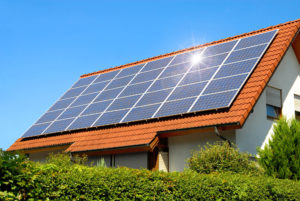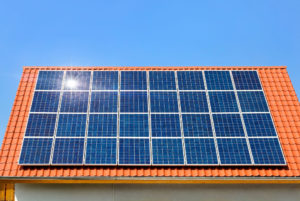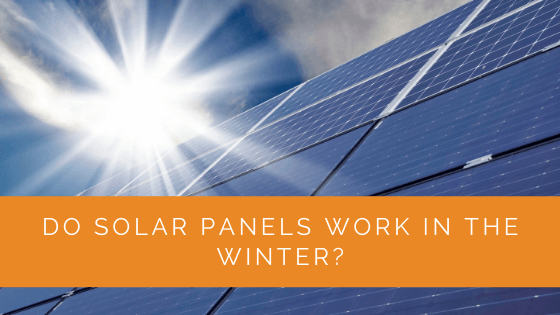With rising electricity prices, solar power has become more indispensable than ever!
Being concerned about solar energy production seems appropriate in the United Kingdom, where winter lasts three months. Although energy output is low during winter, solar panels work in the winter. The low energy output is mainly due to short days and cloudy weather during winter times.
A common myth is that solar panels are ineffective during the winter. Though it is accurate that solar panels produce the most energy when exposed to direct sun rays, the temperature has little impact on the overall efficiency of the solar panel.
Contents
- 1 Key Takeaways
- 2 How Do Solar Panels Work?
- 3 Why Should You Use Solar Power?
- 4 Performance of Solar Panels During Summers vs Winters
- 5 Do Solar Panels Produce Energy During the Winter?
- 6 Does the Solar PV System Produce Energy in the Snow?
- 7 Is It Necessary to Clean Snow From Your Solar Panel?
- 8 Is Solar-Powered Energy Output Good Enough in the Winter?
- 9 Is It Possible to Store Summer Solar Energy and Use It in the Cold Season?
- 10 Tips to Ensure High Solar Panel Performance During Winter
- 11 Case Study: Maximising Solar Energy Output During Winter in a Residential Installation
- 12 Expert Insights From Our Solar Panel Installers About Solar Panel Performance in Winter
- 13 Discover the Power of Solar with Solar Panels Network
- 14 Bottom Line
Key Takeaways
- Solar panels work in the winter, but their energy output is lower due to shorter days and cloudy weather.
- Solar panels rely on sunlight, not heat, so that they can be efficient in colder temperatures, even with shorter daylight hours.
- Snow-covering solar panels can hinder energy production, but most panels are designed to shed snow naturally when the sun comes out, reducing the need for manual snow removal.
How Do Solar Panels Work?
A solar panel is a piece of equipment designed to capture the sun’s rays and use them as a source of energy to generate electricity or heat.
Photovoltaic (PV) cells comprise solar panels, which are specific units often composed of silicon. These PV cells contain electrons activated when they are struck by light particles known as photons. This energy is transformed into a consumable electric current within a cell.
Thus, the working of a solar panel depends on how much sunlight it receives daily.
Why Should You Use Solar Power?
Solar power is a type of renewable energy source that is sustainable over the long term. Studies indicate that solar photovoltaic (PV) energy generation is projected to reach its highest levels in the UK. Here are some benefits of utilising solar power:
- It is a clean source of energy and facilitates sustainable development.
- Ensures a constant supply of electricity and saves electricity bills
- No power loss
- Comparatively cheap source of energy
Thus, solar power is an advantageous and safe source of power.

Performance of Solar Panels During Summers vs Winters
Since solar PV system relies on sunlight for electricity production, it is obvious to wonder the performance difference during summers and winters.
A solar PV system produces less energy during the winter months than the peak summer months. The main reason behind the low solar energy output is the shorter days. Along with receiving less direct sunlight, solar cells receive sun rays for a shorter period and, thus, produce less electricity.
As a result, the long summer days allow you to create more solar electricity than the shorter winter days.
Do Solar Panels Produce Energy During the Winter?
Yes, solar PV systems produce electricity in the winter months. It is vital to note that solar panels rely on the sun’s light, not the sun’s heat. Therefore, they do work in cold weather.
You’ll be shocked to learn that solar panels’ photovoltaic (PV) technology can convert direct light from the sun to power more effectively when the temperature is lower. The primary rationale is that the solar panel’s temperature is lowered due to the weather.
In short, solar panels work efficiently in colder temperatures, even with shorter daylight hours.
Does the Solar PV System Produce Energy in the Snow?
Since snow covers the solar panel, it is unable to generate power. A thick covering of heavy snow during winter will prevent solar radiation from reaching the photovoltaic energy and hinder energy production.
Solar panels are installed at an inclination to maximise the intake of UV rays from the sun, preventing a snow buildup because the bulk of snow may be shed or be readily removed.
Extreme weather conditions like heavy snowfall in the UK are still uncommon and shouldn’t significantly impact solar production.
Is It Necessary to Clean Snow From Your Solar Panel?
Your solar panels will not be able to generate energy if they are covered with snow, as they will receive less sunlight. Therefore, it is crucial to have a clean panel.
Generally, solar panels are built in a way to tolerate severe snowfall. Plus, when the sun comes out after a snowstorm, it will hit the ice layer on your roof, causing it to shed off the solar panels quite rapidly.
As a result, there is no need for you to attempt to remove the snow off your roof.
Is Solar-Powered Energy Output Good Enough in the Winter?
It is well-known that sunlight on a particular day in the winter months is significantly less than in the summertime. Although this reduces the time a solar panel operates at maximum efficiency, the sunlight available in most places makes it worthwhile.
It’s vital to think of solar panels as an investment in reducing total energy use throughout the year when deploying them during the winter months. Even if a solar panel’s effectiveness may be lowered owing to cold temperatures and a lack of sunlight during the cold season, there is still a considerable demand for a solar panel system.
So, it is safe to say that solar panels’ energy output during wintertime is sufficient to meet your needs.

Is It Possible to Store Summer Solar Energy and Use It in the Cold Season?
No, storing the energy generated by the solar panels during summer and using it in lower temperatures is impossible.
But there is a way in which you can save money to purchase electricity when needed. Due to the pleasant summer months, you will undoubtedly have more electricity than required. As a result, the most feasible approach is to sell excess electricity generated by your solar panels during the summertime and then purchase more power from the conventional power grid during the cold season.
This way, the financial situation would be more consistent throughout the year!
Tips to Ensure High Solar Panel Performance During Winter
Below are some helpful tips to obtain the most out of your PV solar system in the wintertime:
- To get the most out of your solar panels, ensure that the angle of the solar panel is inclined to the winter angle.
- Keep in mind to use the essential loads. When not in use, turn off unnecessary lights.
- Replace all of your high-wattage bulbs with energy-saving bulbs.
- Keep a constant eye on the cell temperature and never allow it to drop below zero degrees.
- To save more energy, make sure your home is adequately insulated.
These energy-saving strategies will help you to utilise solar energy efficiently.
Case Study: Maximising Solar Energy Output During Winter in a Residential Installation
Background
At Solar Panels Network, we frequently encounter concerns from homeowners about the effectiveness of solar panels during winter. This case study illustrates our approach to optimising solar energy output for a residential client concerned about maintaining energy efficiency throughout the colder months.
Project Overview
The homeowner was sceptical about the viability of solar panels during the winter, given the shorter days and frequent cloud cover. The goal was to demonstrate that with proper installation and maintenance, solar panels could still provide significant energy savings during winter. The project involved installing a new solar PV system designed to maximise efficiency in low-light conditions and ensure year-round energy production.
Implementation
- Site Assessment and Planning: We assessed the roof’s angle, orientation, and potential shading issues. We determined the optimal angle to maximise sunlight exposure during winter, ensuring the panels would be as efficient as possible.
- Selection of High-Efficiency Panels: We chose monocrystalline solar panels for their superior performance in low-light conditions. These panels have a higher efficiency rate, making them ideal for the shorter, less sunny days of winter.
- Installation Process: The panels were installed at a slightly steeper angle than typical installations to maximise sunlight capture during the winter months. We also integrated a solar battery system to store excess energy generated during sunnier periods.
- Education and Monitoring: We provided the homeowner with comprehensive information on monitoring their system’s performance, emphasising the importance of keeping the panels free from snow and debris. We also demonstrated how the solar battery could be used to balance energy use.
Results
- Consistent Energy Production: Despite the shorter days and frequent overcast weather, the system maintained a steady energy output, covering a significant portion of the household’s energy needs.
- Cost Savings: The homeowner reported a noticeable reduction in their winter energy bills. The savings were amplified by the use of stored energy from the battery during peak hours.
- Environmental Impact: The installation contributed to the household’s reduced carbon footprint, aligning with their commitment to sustainable living.
- Increased Awareness: The homeowner gained a better understanding of how solar panels function in different weather conditions, reinforcing their confidence in renewable energy investments.
Summary
This case study demonstrates that solar panels can be a reliable and efficient energy source during winter, especially when paired with high-quality components and thoughtful installation. The success of this residential installation highlights the importance of proper panel selection, optimal installation angles, and the use of supplementary systems like solar batteries to maximise energy output and savings throughout the year. At Solar Panels Network, we are committed to helping our clients harness the full potential of solar energy, regardless of the season.
Expert Insights From Our Solar Panel Installers About Solar Panel Performance in Winter
Winter can bring challenges, but it’s a common misconception that solar panels don’t work well during this season. Even on cloudy days, panels still generate electricity, albeit at a reduced rate. The key is to optimise the angle and keep them clear of snow.
Senior Solar Technician
Colder temperatures can actually improve the efficiency of solar panels. It’s the lack of sunlight, not the cold, that reduces output. We advise our clients to consider battery storage to make the most of their solar energy year-round.
Solar Installation Specialist
Many people worry about snow covering their panels, but most are designed to let snow slide off naturally. The critical aspect is the installation angle, which we adjust to ensure maximum exposure during winter.
Lead Solar Engineer
Discover the Power of Solar with Solar Panels Network
Are you navigating the world of solar installations? Look no further than Solar Panels Network, the UK’s trusted partner in harnessing the sun’s potential. Our dedication goes beyond just installations; we’re on a mission to transform how homeowners and businesses across the UK perceive and utilise energy. By choosing us, you’re reducing your carbon footprint and making a smart financial move that promises savings for years ahead. Contact us today and embark on your solar journey.
Bottom Line
It would be best to act sensibly when maintaining your solar panels during the harsh wintertime.
Solar energy can be used in cold climates. Although not as efficient as during the warm months, it is still a viable and sustainable renewable energy source.
Solar panels are a sensible investment even in the harshest winters. It’s a plentiful resource with a variety of applications. Your home can also bloom in the cold if solar power is combined with a solar battery.
About the Author
Solar Panels Network stands at the forefront of solar energy solutions, driven by a team of seasoned solar engineers and energy consultants. With over decades of experience in delivering high-quality solar installations and maintenance, we are committed to promoting sustainable energy through customer-centric, tailored solutions. Our articles reflect this commitment, crafted collaboratively by experts to provide accurate, up-to-date insights into solar technology, ensuring our readers are well-informed and empowered in their solar energy decisions.

